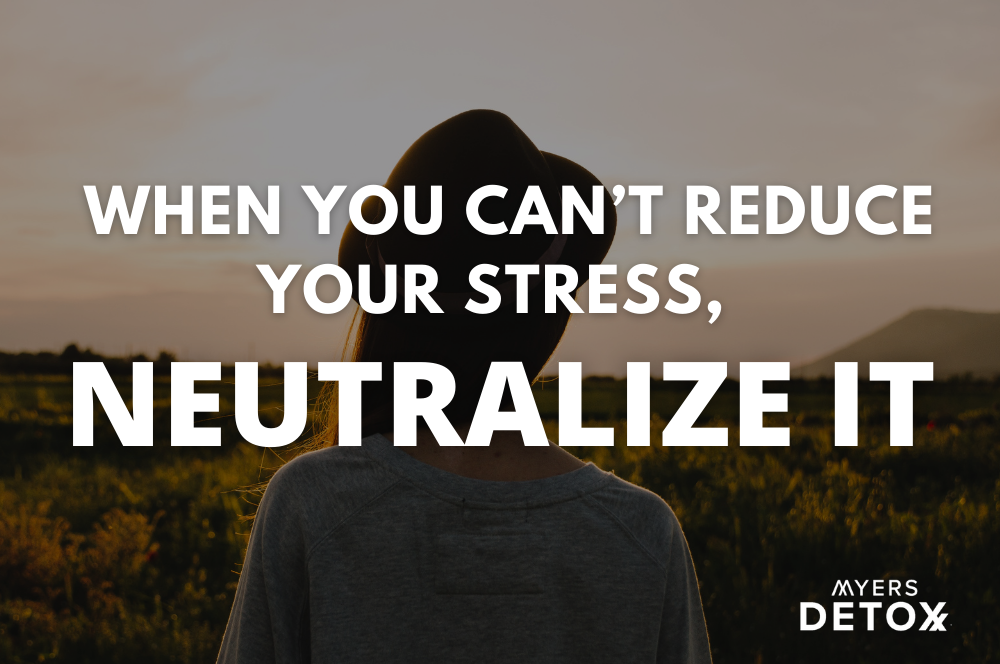If you do a quick google search for “how to manage stress,” you’ll find endless articles that provide different tips, tricks, and techniques for stress management. You’ll likely also find all kinds of supplements, books, talks, and so on that promise to have the answer that will make your stress disappear overnight.
But much of the content and suggestions out there are lacking – they don’t permanently reduce stress and have to be practiced for hours every week to be effective, which is not practical for most people.
So, how can you mitigate stress in your life in a way that will actually produce results?
In this article, you’ll learn:
- Why stress is something that needs to be taken very seriously
- How your body responds when you encounter a stressful trigger
- Why your stress response is both your best friend and worst enemy
- The detrimental downstream impact of stress
- A simple yet profound way to effortlessly neutralize stress
How Seriously Should You Take Stress?
It’s fair to say that stress, like many other things in life, is a relative state. For one person, a stressful week could throw them completely off course, while for another, the stresses of life roll off seemingly without care.
Regardless of which camp you fit into, stress is an unavoidable part of life, and learning how to manage it is crucial for overall health and wellbeing.
It’s easy to overlook the impact that acute stressors have on your life. For instance, let’s say you have a particularly challenging week at work, and you’re feeling on edge for a few days. Perhaps you can’t sleep, or maybe you end up feeling run down or even getting sick. While most people can relate to this scenario, does that mean that this type of stress should be ignored or even considered acceptable.
Absolutely not.
When you let acute stressors go unmanaged, it turns into chronic stress – and that’s where the real danger lies.
So, how seriously should you take stress? Research shows that 75-95% of human diseases are related to the activation of the stress response[1]. That’s a staggering number.
Can you imagine, then, how impactful it could be to learn how to manage and mitigate stress? How much healthier would you be, how much more energy would you have, and how much more productive and enthusiastic would you be in your life?
While most people simply accept that stress is a part of life these days, the truth is that stress has a tipping point. Below a certain threshold, stress can actually be beneficial, pushing you out of your comfort zone and strengthening your will and determination. But past that threshold, it can be severely detrimental.
To better understand the toll that stress has on your physical body, let’s explore the physiology of the stress response.
The Physiology of Stress
To fully grasp the physiology of the stress response and how it can drastically change your state of being, it’s crucial to understand why this response was developed in the first place.
The stress response is one of the oldest mechanisms of the human body. Long before the development of the rational and logical brain, there were neural pathways in place to deal with stressors. Why? Because this is your survival response.
Your primitive ancestors would not have made it very far in history if this survival mechanism wasn’t in place, and thankfully it was, or we likely wouldn’t be here today.
Unlike the sheltered world we live in today, your ancestors often had real threats at their doorstep. Life wasn’t quite as comfortable back then, whether this came in the form of a predator, a raging storm, or even another human. The ability to respond to a threat quickly and efficiently was the difference between life and death.
Unfortunately, although we aren’t in life or death situations as often as our ancestors, our bodies and brains haven’t gotten the message. As a result, when you feel stress in your daily life, your body can react as though your life is in danger.
What exactly happens in a stress response?
Regardless of the situation (physical, emotional, chemical), your body responds to a stressful trigger by activating the amygdala (the brain region responsible for the stress response). The amygdala then goes on to alert a channel in your body called the HPA axis (hypothalamus-pituitary-adrenal). This triggers the release of stress hormones from your adrenal glands, including cortisol, adrenaline, epinephrine, and norepinephrine[2].
Once these stress signals are active, your body is officially in a stress response, also known as “fight or flight.”
In this response, your sympathetic nervous system is activated, which primes your body to fight or flee from whatever threat may be in your environment. As a result, your heart rate speeds up, your breathing becomes more shallow, your blood flows to your limbs, your senses sharpen, and your muscles become more activated. In other words, you’re ready to take on a threat[3]!
This system is incredibly complex and equally as efficient. If it wasn’t, humans likely wouldn’t have been able to evolve as they have.
But here’s the trouble. While your ancestors would come face to face with a threat every now and then, today we deal with stressors on a daily basis. If our brain was able to judge the severity of a stressor, then it would likely fall back and slow down the stress response.
Unfortunately, that’s not the case. Instead, your brain and body respond to everyday stressors as though it was a life-threatening scenario. As you can imagine, this takes a significant toll after a while.
The Downstream Impact of Stress
In the last several years, researchers have begun to deeply understand the immense impact of the stress response on the physical body. As mentioned previously, 75-90% of all diseases are said to be related to stress[1].
How can one response impact your body so significantly? When the stress response is active, it diverts energy away from other systems in your body. Your brain says, “Okay, they’re dealing with a life-threatening situation, this is not a time to focus on detox or digestion or sleep or healthy circulation, and it’s certainly not a time to nourish and strengthen the immune system.”
As a result, your body experiences both functional and structural changes that set the stage for further imbalances. Some examples include[4][5][6]:
- Issues with memory, learning, and overall cognitive function due to changes in neurological architecture.
- Digestive disorders such as colitis, IBS, and Crohn’s disease are due to inflammation in the GI tract.
- Nutrient malabsorption, lowered gastric secretions and reduced appetite due to impaired digestive functions.
- Issues with blood pressure, heart rate, and circulation may increase the risk of stroke and heart attack due to changes in cardiovascular function.
- More frequent illness and increased risk for chronic disease due to suppression of immune activity.
As you can see, almost every system in your body takes the back burner when your stress response is active, including detox. And the worst part is that as these systems become weaker, it creates even more stress on your body, resulting in a snowballing effect of stress and illness.
Stress-reducing Activities
A life completely free of stress is impossible. Stress is relative, so even if you significantly reduce all your current stressors, more will pop up to take their place. And that’s okay.
Furthermore, some stress is actually a good thing. The term eustress describes the type of stress that we encounter that actually strengthens us and creates more resilience. Again, there is a threshold in which stress is not necessarily bad.
So, we can’t eliminate stress altogether, we need to mitigate it.
With that being said, there are several enjoyable activities that research shows can help you to relieve excess stress in your daily life, including[7][8][9][10]:
- Meditation
- Yoga
- Exercise
- Deep breathing
While these activities are wonderful for managing stress, the truth is that today we as humans are encountering more stress than ever before. Most of us find ourselves in a stress spiral due to a nervous system that’s already on edge. So the question becomes, how do we keep our nervous system balanced?
A Simple Tool For Effortlessly Neutralizing Stress
Meditation teachers will tell you that it’s the days when you feel like you don’t have any time to meditate that you need it more than ever. While this sentiment makes a lot of sense, it still doesn’t make it any easier to sit down on your meditation cushion, get out for a walk, or even spend five minutes in deep breathing.
The truth is that today we need something that can help us manage stress while we go about our daily activities. In essence, we need a constant companion whispering words of encouragement to our nervous system.
This is exactly what the Harmoni Pendant does.
The Harmoni Pendant is a small necklace that can be worn every day that acts as your stress-neutralizing ally. The pendant is specifically designed to work with your body’s energy field and mitigate the impact that stress has on your physiology.
If you’re unfamiliar with the concept, your energy field (or biofield) is a field of energy that surrounds your physical body. While ancient systems of medicine have been aware of this field for thousands of years, modern science has finally proven its existence.
The biofield is highly involved in the health and wellness of your mind and body. When this field is in balance, it creates conditions in your physical body for health and longevity.
By acting on this field, and the energy systems within your physical body, the Harmoni Pendant has been shown to improve several markers of stress.
For example, research shows that wearing the Harmoni Pendant can[11]:
- Improve heart rate variability (a biological marker for stress) by 700%
- Significant increase energy reserves and mitochondrial power by 530%
- Improve markers of overall health by 138%
- Enhance the body and brain’s ability to handle stress by 100%
- Enhance autonomic regulation by 310%
All of this just by wearing a necklace.
This doesn’t mean that you should forgo activities like movement and self-reflection that can help you manage stress. Instead, Harmoni Pendant improves your ability to handle stress and therefore helps to create a state of mind in which you can actually make space for other stress-reduction activities. It lowers your stress set point so you can handle stress more easily and with more resilience.
Stress is challenging to lower. And it is a big roadblock to improving one’s health that I see time and again with my patients. They just can’t get out of their stressed state. But with the Harmoni Pendant, you’re able to lower stress levels on a permanent basis, as long as you wear the pendant. It’s a way to quickly lower your stress levels on a consistent basis, which has a positive downstream effect on your overall health.
Takeaway
Stress is an inevitable part of being human, but it’s something that needs to be managed on a continuous basis – not ignored. The detriments of stress only present when you let the stress response go unmanaged for long periods of time.
Getting ahead of a chronic stress response can feel like a full-time job, which is why we need more than stress-management techniques these days; we need a constant ally. Using a stress-management device like the Harmoni Pendant offers an effortless tool for mitigating the stress response while allowing you to go about your daily life.
To learn more about the pendant, or to order one today, check out this link, and take your first step in neutralizing your stress.
*The product mentioned in this article is not intended to diagnose, treat, cure, or prevent any disease. The information in this article is not intended to replace any recommendations or relationship with your physician.










